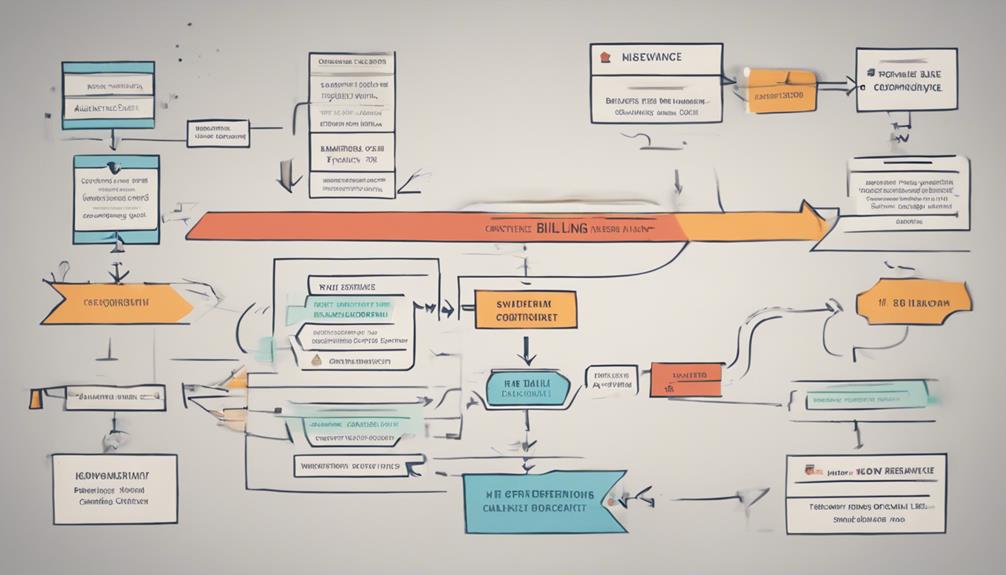Credit card processing outages stem from software disruptions, technical issues, or hardware malfunctions, including internet problems and POS system glitches. Swiftly identifying the cause helps in efficient troubleshooting. Outages delay payments, damage brand image, and jeopardize security. Troubleshoot hardware, update software, and engage processors for assistance. Utilize encryption, adhere to security standards, and implement tokenization for data protection. Choose a processor with robust security measures and efficient transaction processing. Mitigate outage impacts by exploring diversified payment methods. Understanding the causes and solutions for credit card processing outages is essential for safeguarding your business operations. When selecting a payment processor, it is important to ask vital questions for payment processor selection. Consider their track record with handling outages and their response time in resolving technical issues. Additionally, inquire about their backup systems and redundancy measures to ensure seamless payment processing in the event of an outage. By asking these vital questions, you can choose a payment processor that prioritizes reliability and security, ultimately safeguarding your business from potential disruptions.
Key Takeaways
- Software disruptions, technical issues, and hardware malfunctions are common causes of credit card processing outages.
- Payment delays, brand reputation damage, and compromised security are impacts of processing outages.
- Troubleshoot hardware, update software, engage processors, monitor Downdetector, and address outages promptly.
- Utilize encryption, adhere to PCI standards, and implement tokenization for enhanced payment security.
- Select a processor with robust security, efficient processing, PCI compliance, and reliable customer support.
Common Causes of Processing Outages

When experiencing credit card processing outages, identifying the underlying causes promptly is crucial to expedite resolution and minimize disruptions. Outages can arise from various sources, including software disruptions, technical issues, or hardware malfunctions. If an outage occurs, the payment processor should promptly investigate the issue and communicate with affected merchants to provide updates and potential workarounds. This highlights the vital questions for payment processor selection, including their responsiveness in addressing outages and their ability to quickly diagnose and resolve issues to minimize impacts on businesses and customers. Additionally, merchants should also consider a payment processor’s track record in maintaining uptime and reliability to ensure seamless payment processing operations. In addition to responsiveness and reliability, another vital consideration for payment processors is the level of security they provide. With the increasing threat of cyber-attacks, it’s crucial to partner with a processor that prioritizes security measures and has a strong track record in safeguarding sensitive payment data. Furthermore, merchants should also assess the scalability and flexibility of the payment processor, ensuring they can accommodate the evolving needs of the business and adapt to technological advancements in the payment industry. Overall, these vital considerations for payment processor selection are instrumental in ensuring smooth and secure transactions for both businesses and customers.
Internet problems are a common culprit, while hardware malfunctions in POS systems or card readers can also trigger disruptions. Additionally, payment software glitches may lead to processing interruptions.
Widespread power outages pose another risk, causing significant processing disruptions. By swiftly pinpointing the root cause of these outages, businesses can efficiently address the issues at hand, restore normal operations, and guarantee seamless credit card transactions for customers. This is why having a reliable and robust payment processor is crucial for businesses. It is important to ask vital questions for payment processor selection such as their reliability during power outages and their ability to swiftly address any disruptions. By carefully selecting a payment processor that can handle these challenges, businesses can ensure smooth operations and maintain customer satisfaction even in the face of unexpected outages.
Stay vigilant and proactive in diagnosing and resolving these issues to maintain a smooth payment processing system.
Impact on Business Operations

The impact of credit card processing outages on business operations can be detrimental, affecting revenue streams and customer satisfaction. When processing systems fail, it leads to payment delays or an inability to accept credit card transactions, hampering cash flow. This disruption can tarnish your brand reputation and credibility, potentially driving customers away. Therefore, it is crucial for businesses to have contingency plans in place to mitigate the impact of credit card processing outages. This includes establishing alternative payment methods, such as cash or mobile payment options, and communicating effectively with customers about the situation. Furthermore, ensuring the reliability and scalability of payment processing systems are vital considerations for payment processors in order to maintain seamless operations for their clients.
Additionally, outages may compromise payment security, putting sensitive data at risk. Your operations rely heavily on smooth transactions, and any interruption can cause significant financial losses. It's important to address these issues promptly to minimize the negative consequences on your business.
Prioritizing the resolution of processing outages is vital to ensure seamless operations and maintain customer trust.
Strategies for Resolving Outages

To effectively address credit card processing outages, focus on implementing proactive troubleshooting strategies and ensuring prompt resolution. Here are some steps to help you resolve outages efficiently: One way to address credit card processing outages is to regularly monitor and analyze system performance to identify and address potential issues before they lead to outages. Additionally, having a reliable backup processing system in place can help minimize the impact of outages and ensure that payments can still be processed. Another important factor to consider is payment processor selection, as not all processors offer the same level of reliability and support during outages. Selecting a reputable and dependable payment processor can help minimize the risk of processing outages. When experiencing credit card processing outages, it’s essential to have a clear understanding of the vital questions for payment processor selection. This includes evaluating the processor’s track record for uptime and reliability, as well as their customer support and response time during outages. Additionally, consider the scalability and flexibility of the payment processor to ensure they can meet your business needs and adapt to any future growth or changes in payment processing requirements. By addressing these vital questions for payment processor selection, you can better mitigate the impact of credit card processing outages and ensure a more seamless payment processing experience for your customers.
- Troubleshoot hardware issues: Check for physical damages or glitches in your equipment.
- Keep software updated: Guarantee your systems are running the latest software versions and reboot as needed.
- Engage credit card processors: Seek assistance from your credit card processor for malfunctions and consider providing additional equipment if required.
- Utilize Down Detector: Use this tool for real-time notifications during outages and monitor Downdetector to gauge the impact on various parties.
Importance of Security Measures

Enhance your business's resilience against credit card processing outages by prioritizing robust security measures. Implementing strong security protocols is vital to safeguarding sensitive credit card data and preventing potential breaches. By investing in reliable security measures, you can guarantee the trust of your customers and mitigate the risk of processing disruptions. Consider the following table to understand the essential security measures for protecting your credit card processing system:
| Security Measure | Description |
|---|---|
| Encryption Technology | Utilize encryption to secure cardholder data during transmission. |
| PCI Compliance | Adhere to Payment Card Industry Data Security Standards. |
| Tokenization | Replace sensitive data with unique tokens for enhanced security. |
Selecting a Reliable Processor

When considering a reliable credit card processor, prioritize security and efficiency to safeguard your transactions. Here are some key factors to keep in mind:
- Payment Security: Opt for a processor with robust security measures to protect sensitive credit card data.
- Efficient Processing: Choose a processor like EBizCharge known for efficient transaction processing.
- PCI Compliance: Make sure the processor is fully compliant with Payment Card Industry Data Security Standards for enhanced security.
- Customer Support: Look for a processor that offers reliable customer support to address any processing disruptions promptly.
Selecting a processor that excels in these areas can help guarantee smooth and secure credit card transactions for your business.
Diversifying Payment Methods

Consider expanding your payment options to guarantee seamless transactions by incorporating various payment methods. Diversifying the ways customers can pay can help mitigate the impact of credit card processing outages. Accepting alternative methods like mobile payments, digital wallets, or even cash can make sure that you can still conduct transactions even if one method experiences an outage.
By offering multiple payment options, you provide flexibility for your customers and reduce the risk of losing sales during processing disruptions. Additionally, having a diverse range of payment methods can cater to different customer preferences, enhancing their overall shopping experience.
Take proactive steps to integrate different payment solutions into your business strategy to maintain operational continuity in the event of processing outages.
Mitigating Outage Impacts

To minimize the impact of credit card processing outages, focus on implementing proactive strategies that guarantee operational continuity and customer satisfaction.
- Establish Redundant Systems: Have backup processing systems in place to switch over seamlessly during outages.
- Regular System Maintenance: Conduct routine checks and updates to prevent potential issues before they occur.
- Customer Communication Plan: Inform customers promptly about outages and provide alternative payment options.
- Monitor and Analyze: Keep track of outage frequency and duration to identify patterns and take preventive measures.
Frequently Asked Questions
How Can Businesses Communicate With Customers During Processing Outages?
During processing outages, businesses should communicate with customers promptly. Use multiple channels like social media, email, and website banners to inform customers.
Provide updates on the issue, expected resolution time, and alternative payment options if available. Offer sincere apologies for the inconvenience caused and reassure customers of data security.
Transparency and timely updates can help maintain customer trust during processing disruptions.
Are There Insurance Options to Cover Losses During Processing Outages?
Insurance options to cover losses during processing outages vary. Some policies might include coverage for financial losses resulting from outages, while others may require specific add-ons for such protection.
It's crucial to review your insurance policy carefully to understand the extent of coverage during processing disruptions. Contact your insurance provider for detailed information on available options and the level of protection they offer in case of outages.
Can Businesses Implement Backup Systems to Prevent Processing Outages?
To prevent processing outages, you can implement backup systems. Having redundant systems in place helps maintain operations during disruptions.
Consider backup power sources, duplicate hardware, and failover mechanisms for internet connectivity. By investing in backup solutions, you can minimize the impact of outages and guarantee smooth credit card processing for your business.
What Are the Legal Implications for Businesses During Processing Outages?
During processing outages, businesses face legal implications such as breaching service agreements, violating consumer rights, and potential lawsuits.
Non-compliance with data security regulations during outages can lead to hefty fines. Ensuring proper documentation of outages and communication with affected parties is essential.
Implementing backup systems can mitigate legal risks and demonstrate proactive measures to address disruptions. Seek legal advice to navigate the complexities of processing outages and protect your business from legal consequences.
How Do Processing Outages Affect Employee Productivity and Morale?
When processing outages occur, employee productivity and morale can take a hit. Delays in transactions may lead to longer work hours or frustrated staff dealing with payment issues. It can disrupt workflow, causing stress and impacting morale.
Employees might face challenges in completing tasks efficiently, affecting their motivation and job satisfaction. Addressing outages promptly and providing support can help maintain productivity levels and keep morale high during these disruptions.
Conclusion
To sum up, credit card processing outages can have a significant impact on your business operations. By understanding the common causes and implementing proactive solutions, you can minimize the risk of disruptions. It is essential to regularly review the performance of your payment processor and consider alternative options if necessary. Asking vital questions about payment processor selection, such as their reliability, security measures, and customer support, can help you make an informed decision that will ultimately benefit your business. Taking proactive measures can help ensure that your credit card processing runs smoothly, providing a better experience for both you and your customers. It’s also important to have a backup plan in place in case your current payment processor experiences an outage. Researching and understanding alternative payment processor options can offer you a sense of security and peace of mind. By having a contingency plan, you can quickly switch to a secondary payment processor and minimize the impact on your business in the event of an outage.
Remember, staying informed, prepared, and equipped to handle any issues that arise is key to maintaining a seamless payment process. Coincidentally, taking these steps can also help safeguard your revenue and reputation in the long run.










